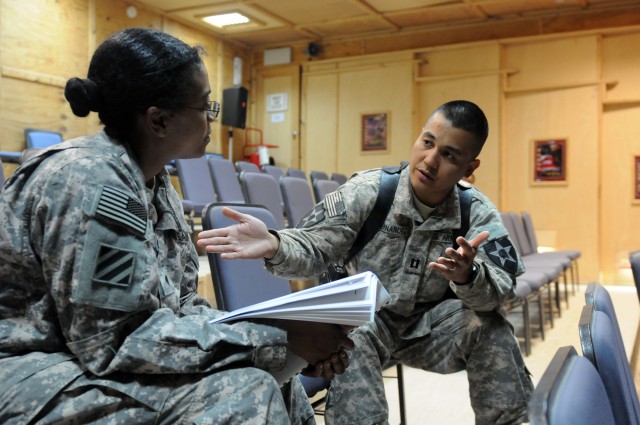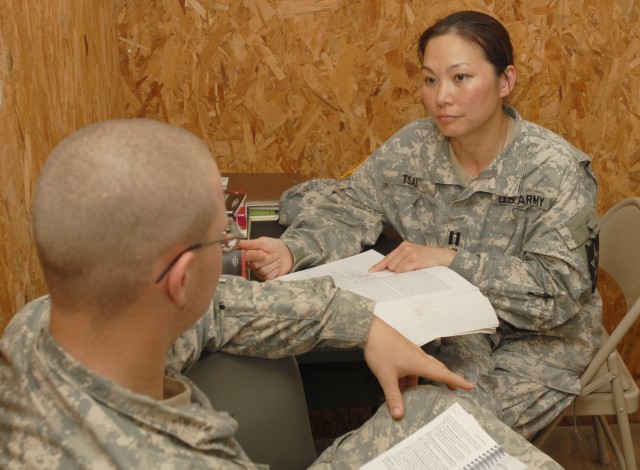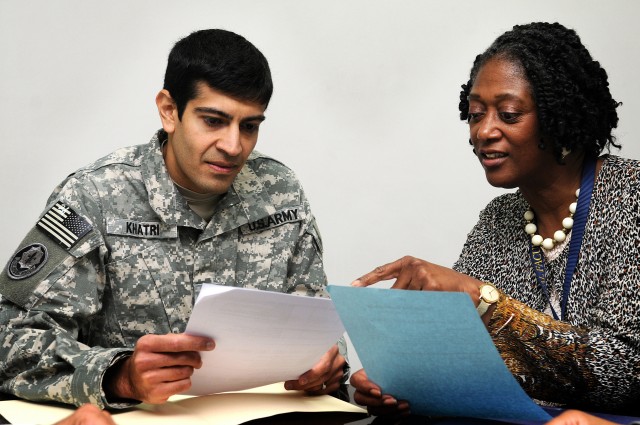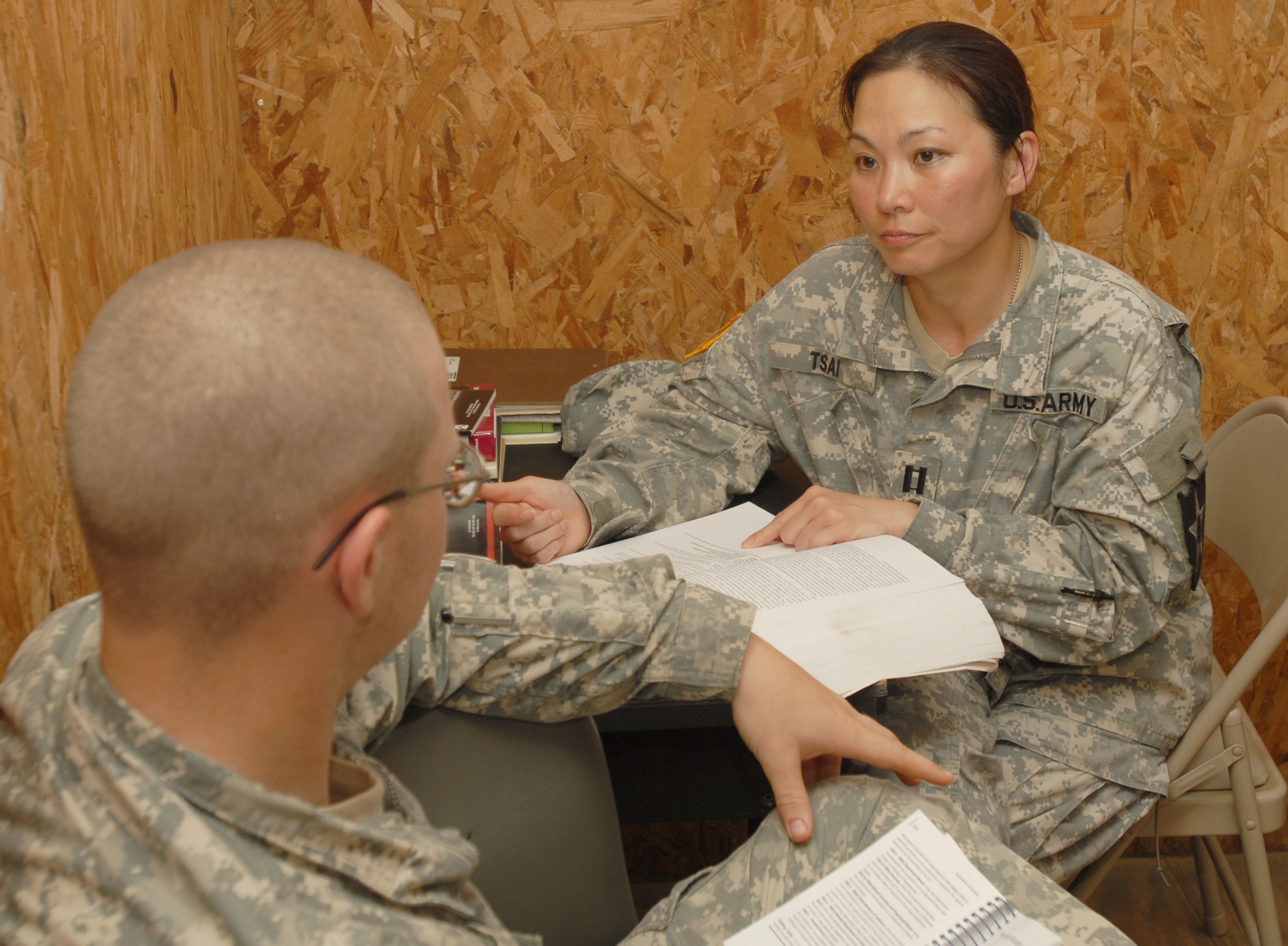Soldiers take care of Soldiers. Period.
It doesn't matter whether it's a commander or noncommissioned officer keeping an eye on a young specialist, or two battle buddies watching out for each other. It doesn't matter if it's carrying a wounded comrade off a battlefield, or making sure a traumatized warrior gets the help he or she needs.
And that means that, "suicide prevention fits into what they do every day," said Col. Rebecca Porter, a clinical psychologist and chief of the Behavioral Health Division at the Office of the Surgeon General, especially because research shows that the earlier someone gets help, the better his or her chances of healing.
The Army suicide rate-despite programs and training in place and senior leader' efforts to reduce the stigma associated with seeking behavioral health care-has left many officials scratching their heads and asking, "Why'"
Porter believes that when the Centers for Disease Control and Prevention next releases the national suicide statistics, those numbers will show an increase in suicides across America, not just the Army. (2010 active-duty suicides actually dropped for the first time in several years to 156, down from 162 in 2009. However, reserve-component suicides almost doubled from 80 to 145.) Despite the availability of programs and training, and tireless efforts to eliminate the stigma associated with seeking behavioral health care, the numbers indicate these aren't just Army issues, but national ones.
Some young Soldiers have reported receiving mixed signals from their junior leaders when it comes to going to behavioral health, but Porter believes those platoon- and company-level leaders are acting out a misguided attempt to protect their Soldiers. That's not the message Army leaders want them to receive, however; they want to erase any stigma and eliminate even the best-intentioned obstacles to care.
Some senior leaders have themselves come forward after receiving behavioral health treatment. Maj. Gen. David Blackledge, the assistant deputy chief of staff, G-3/5/7, for Mobilization and Reserve Affairs, has undergone treatment for post-traumatic stress disorder. He started experiencing flashbacks and nightmares after he was injured during two deployments to Iraq. Porter said Blackledge came forward to show young Soldiers they had nothing to fear.
"I think that's what's really encouraging...that the leadership...has taken this on as a responsibility for looking out for Soldiers, and returning to what Vice Chief of Staff of the Army Gen. Peter W. Chiarelli's task force report refers to as 'the art of garrison leadership,'" Porter said.
While she and other doctors mostly see cases of depression, substance abuse and anxiety disorders like PTSD in veterans, Porter said that all Soldiers should expect some changes following a deployment. Individuals can experience symptoms including difficulty sleeping, discomfort with crowds and hyper vigilance of their surroundings-all traits that help Soldiers stay alive in a war zone, and all normal reactions when readjusting to garrison or civilian life. Porter added that it's common for these symptoms to last anywhere from six months to two years.
If something doesn't feel right, however, she said Soldiers shouldn't hesitate to talk to someone-whether it's a primary care doctor, a chaplain or a behavioral health provider.
Sometimes they just need help learning relaxation techniques or suggestions to better manage stress, and early intervention could keep their symptoms from becoming full-blown disorders, Porter explained. For that reason, Soldiers should take their post-deployment health assessments and reassessments seriously and be honest about what they are experiencing. (For more information on the PDHRA, see "Safe & sound from downrange" in the July 2010 issue of Soldiers at http://www.army.mil/soldiers/archives/.)
"It could just be that when you get back you don't feel quite like you did before you left, whether...you feel angry or irritable, if you have a hard time relaxing or a hard time sleeping or if you're just drinking more than you used to," Porter explained. "Those are all things that, if you're aware that it's impacting your day-to-day life-whether it's with your Family or work, or if you just have concerns about it-then you should go and talk to somebody."
To support Soldiers and their Families, the Army has increased the number of behavioral health providers by 67 percent since 2007 (to 3,800). Additionally, it is standardizing programs servicewide under the Comprehensive Behavioral Health System of Care so all Soldiers-active duty, Guard and Reserve-will have the same experience.
The Army is also putting behavioral health providers closer to Soldiers, because, "If you see them at the dining facility in a nonclinical setting, then when you do need them, you're willing to say, 'I know Doc Porter and I'm going to talk to her about this,'" said Porter. Part of that effort involves assigning active-duty behavioral health professionals to brigade combat teams, so Soldiers can get to know them and they can keep an eye on Soldiers who need or are already receiving help.
Army doctors recently published a study in the American Journal of Psychiatry in which they gave 10,678 Soldiers from three 3rd Infantry Division brigade combat teams 15 extra behavioral health questions on their 2007 pre-deployment screenings. Questions like, "Are you currently taking any medications for a mental health condition'" and, "Do you have any past or recent history of suicidal or homicidal thoughts, plans or attempts'" helped behavioral health professionals identify which Soldiers shouldn't deploy and who they needed to closely monitor in theater.
They compared the study BCTs to three BCTs that did not participate in the Pre-Deployment Mental Health Screening/Care Coordination Program, and found that the Soldiers who received additional screening had significantly lower rates of combat-operational stress reactions, treatment for behavioral health diagnoses, duty restrictions, evacuation from theater, and suicidal thoughts and feelings. (For more information, see http://www.army.mil/-news/2011/01/18/50501-study-shows-additional-pre-deployment-screening-yields-benefits-to-soldiers/.)
To help Soldiers at remote bases without immediate access to a provider, the Army is also standardizing telebehavioral health and virtual behavioral health using video teleconferences, Porter said, explaining that the Northern and Pacific Medical Regions have been doing evaluations and psychotherapy remotely for several years. Some younger Soldiers, who are used to interacting with their friends via the Internet, actually prefer it, and the results are comparable to face-to-face care, she added.
Similarly, TRICARE offers 24-hour, short-term counseling via the Internet and Skype through its Assistance Program, and servicemembers can confront their PTSD virtually in a 3-D video game-style format at the Department of Defense Virtual PTSD Experience. A free smart phone application is even available to help servicemembers and their Families track their mental health. (See http://www.army.mil/-news/2011/02/01/51152-tricares-at-home-counseling-program-reaches-nearly-3000-calls/ and http://www.army.mil/-news/2011/01/24/50751-dod-gives-ptsd-help-second-life-in-virtual-reality/ for more information.)
Once a Soldier begins seeing a behavioral health provider, that practitioner will work with him or her to decide the best course of treatment. That may be talk therapy or a combination of talk and drug therapy. It may be at the provider's office, at a daily, intensive outpatient treatment program or at an inpatient program. Army doctors will refer Soldiers to civilian facilities when there aren't military or Department of Veterans Affairs programs nearby.
"It really depends on how the Soldier is able to function at work and at home," Porter said. "We go for the least intrusive form of treatment that will still work for the Soldier. We're not out there looking to hospitalize all the Soldiers when it would be more appropriate and just as effective to work with them on an outpatient basis.
"If Soldiers can be honest so that we can talk with them and get an idea of what's going on, then they're more likely to have a good outcome.
Editor's note: Alexandra Hemmerly-Brown, formerly of the Army News Service, contributed to this article.
KIDS MAY NEED HELP TOO
Deployments aren't only stressful for Soldiers. They can disrupt entire Families, and children especially may not know how to deal with the changes in their lives.
Several recent studies have shown that children of deployed parents may be at higher risk for depression and may act out more than their peers, and the Child and Family Behavioral Health Office at Joint Base Lewis-McCord, Wash., is looking at the best programs to help them.
The CFBHO will probably become the standard across the Army, according to Col. Rebecca Porter, chief of the Behavioral Health Division at the Office of the Surgeon General.
"What we know about the way that children respond to deployment is that to the extent that we can provide them (with) stability and decreased turbulence at home during a deployment, they will do better," said Porter, who is also a clinical psychologist. "So I would encourage the parent who's at home to reach out to their peers for support, to reach out to their behavioral health or primary care providers, or even their chaplains to help stabilize how things are at home."
Reactions vary from child to child, and by age. While young children might not be able to express their feelings and may become more irritable or act out, Porter said, older children and teens may become angry, withdrawn or moody.
Parents should also watch out for any changes, like falling grades, and notify teachers and school counselors when mom or dad deploys. If a school isn't outside a major installation with large units deploying, Porter explained that teachers might not even know about changes at home.






Social Sharing